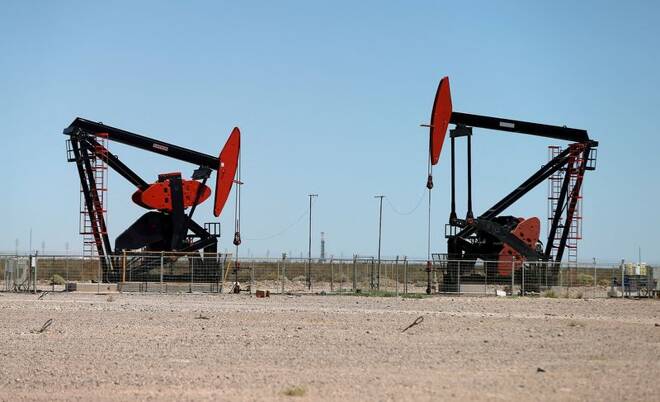Advertisement
Advertisement
Oil muted as price cap proposal eases supply concerns
By:
By Yuka Obayashi TOKYO (Reuters) - Oil prices fell on Thursday, extending losses from the previous session, as fears of supply disruption eased on news that the Group of Seven (G7) nations were considering a high price cap on Russian oil.
By Nia Williams
(Reuters) -Benchmark Brent oil edged lower on Thursday while West Texas Intermediate (WTI) crude held steady, hovering in sight of two-month lows as the level of a proposed G7 cap on the price of Russian oil raised doubts about how much it would limit supply.
A bigger-than-expected build in U.S. gasoline inventories and widening COVID-19 controls in China also added downward pressure on crude prices.
Brent crude futures were down 29 cents, or 0.3%, to $85.12 a barrel by 15.15 p.m. ET (2015 GMT), while U.S. WTI crude futures rose 2 cents, to $77.96.
Trading volumes were thin because of the Thanksgiving holiday in the United States.
Both benchmarks plunged more than 3% on Wednesday on news the planned price cap on Russian oil could be above the current market level.
European Union governments remained split over what level to cap Russian oil prices at to curb Moscow’s ability to pay for its war in Ukraine without causing a global oil supply shock, with more talks possible on Friday if positions converge.
The G7 group of nations is looking at a cap on Russian seaborne oil at $65-$70 a barrel, a European official said, though European Union governments have yet to agree on a price.
A higher price cap could make it attractive for Russia to continue to sell its oil, reducing the risk of a supply shortage in global oil markets.
Some Indian refiners are paying the equivalent to a discount of around $25 to $35 a barrel to international benchmark Brent crude for Russian Urals crude, two sources said. Urals is Russia’s main export crude.
“The Russian price cap is another catalyst that served to get prices lower over the last little while,” said Bart Melek, global head of commodity market strategy at TD Securities, adding he was fairly bullish on oil despite the headwinds.
Oil prices also came under pressure after the Energy Information Administration (EIA) said on Wednesday that U.S. gasoline and distillate inventories rose substantially last week. [EIA/S]
But crude inventories fell by 3.7 million barrels to 431.7 million barrels in the week to Nov. 18, compared with expectations for a 1.1 million barrel drop in a Reuters poll of analysts.
China on Wednesday reported the highest number of daily COVID-19 cases since the start of the pandemic nearly three years ago. Local authorities tightened controls to stamp out the outbreaks, adding to investor concern over the economy and fuel demand.
(Reporting by Ahmad Ghaddar; Additional reporting by Nia Williams in British Columbia, Ahmad Ghaddar in London, Yuka Obayashi in Tokyo and Muyu Xu in Singapore; Editing by Marguerita Choy, Mark Potter and Daniel Wallis)
About the Author
Reuterscontributor
Reuters, the news and media division of Thomson Reuters, is the world’s largest international multimedia news provider reaching more than one billion people every day. Reuters provides trusted business, financial, national, and international news to professionals via Thomson Reuters desktops, the world's media organizations, and directly to consumers at Reuters.com and via Reuters TV. Learn more about Thomson Reuters products:
Advertisement
